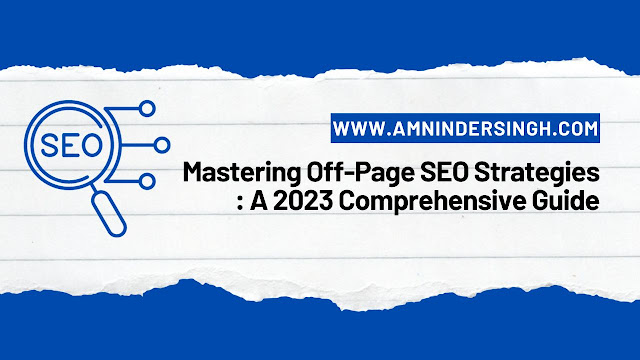Off-page SEO is a critical component of any successful digital marketing strategy.
It involves optimizing factors outside your website to improve your online presence, authority, and search engine rankings.
This comprehensive guide will walk you through the key concepts and strategies to master off-page SEO and enhance your website’s visibility in search engine results pages (SERPs).
Understanding Off-Page SEO
Off-page SEO involves optimizing elements outside your website to demonstrate its credibility, authority, and relevance to search engines.
Google and other search engines use off-page signals to determine your website’s trustworthiness and ranking in SERPs.
Link Building Strategies
a. Guest Blogging
Guest blogging involves writing high-quality content for other reputable websites in your niche.
In exchange, you can include links back to your website within the content.
This not only builds backlinks but also establishes your authority in your industry.
b. Broken Link Building
Identify broken links on other websites and reach out to suggest your content as a replacement.
This strategy helps you acquire high-quality backlinks while providing value to other website owners.
c. Outreach and Relationship Building
Build relationships with influencers, bloggers, and webmasters in your niche. Outreach for guest posting opportunities, partnerships, and mentions. These relationships can lead to valuable backlinks and collaborations.
d. Influencer Collaboration
Partner with influencers to promote your content or products. Their endorsement can drive traffic and improve your website’s credibility.
e. Social Media Promotion
Share your content on social media platforms to increase its visibility. Encourage social sharing and engagement to boost your content’s reach and generate social signals.
Content Marketing
a. High-Quality Content Creation
Create informative, engaging, and shareable content that addresses the needs and interests of your target audience. High-quality content naturally attracts backlinks and social shares.
b. Content Promotion and Distribution
Leverage email marketing, social media, and outreach to promote your content. Share it with your network and encourage others to do the same. This amplifies your content’s reach and impact.
Online Reputation Management
a. Online Reviews and Ratings
Encourage satisfied customers to leave positive reviews and ratings on platforms like Google My Business and Yelp.
Monitor and address negative feedback promptly.
b.Social Proof and Trust Signals
Display trust signals such as awards, certifications, and testimonials on your website. They enhance your credibility and reputation.
5. Social Signals
Engage with your audience on social media platforms. High levels of social activity and shares can positively influence your search engine rankings.
Local SEO and Citations
Optimize your website for local searches by creating and maintaining consistent business listings (citations) on platforms like Google, Bing, and Yelp.
Ensure that your NAP (Name, Address, Phone Number) information is accurate across all listings.
Technical Considerations
a. Mobile Optimization
Ensure your website is mobile-friendly and responsive. Google gives preference to mobile-optimized websites in its rankings.
b. Page Speed
Optimize your website’s load times to improve user experience and SEO. Use tools like Google PageSpeed Insights to identify and fix speed-related issues.
Monitoring and Analytics
Use tools like Google Analytics, Google Search Console, and third-party SEO platforms to monitor your off-page SEO efforts.
Track key metrics such as backlinks, referral traffic, social engagement, and keyword rankings.
Analyze the data regularly to refine your strategy.
Off-Page SEO Strategies : Conclusion
Mastering off-page SEO is essential for improving your website’s visibility, authority, and search engine rankings.
By implementing these strategies and continuously monitoring your efforts, you can strengthen your online presence and attract more organic traffic.
Remember that off-page SEO is an ongoing process that requires consistent effort and adaptation to stay competitive in the ever-evolving digital landscape.
This article is a part of our Search Engine Optimization (SEO) Module.
Module 4: Search Engine Optimization (SEO)
4.1 Understanding Search Engine Dynamics
4.2 Implementing On-Page SEO Techniques
4.3 Mastering Off-Page SEO Strategies
4.4 Navigating Technical SEO Challenges
4.5 Leveraging SEO Tools and Analytics

